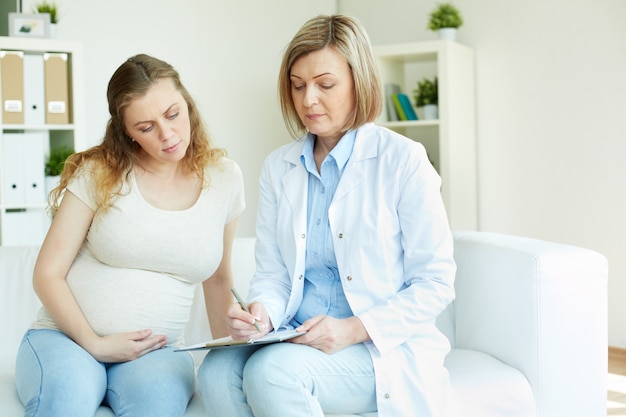
When an egg released from the ovary successfully merges with a sperm, fertilization or pregnancy occurs. The fertilized egg then travels to the uterus to attach itself to the uterine lining. However, in an ectopic pregnancy, the fertilized egg implants itself elsewhere, typically in the fallopian tube, which needs immediate treatment to prevent severe complications.
Ectopic pregnancy isn’t very common, affecting about 1 in 50 women. This happens when the fertilized egg attaches outside the uterus, like in the fallopian tube or other abdominal areas, where it can’t develop into a baby. This is a medical emergency that requires prompt attention, as it can be life-threatening and affect future pregnancies and overall reproductive health. Immediate treatment can help reduce risks.
Causes of Ectopic Pregnancy
Several factors can contribute to ectopic pregnancy:
– Intrauterine Device (IUD): If a woman of childbearing age has an IUD inserted, there’s a chance of ectopic pregnancy since the fertilized egg might implant in the fallopian tube instead of the uterus.
– Fertility Treatments: Procedures like embryo transfer during fertility treatment might result in the embryo moving to and implanting in the fallopian tube, causing an ectopic pregnancy.
– Previous Ectopic Pregnancy: If a woman has had an ectopic pregnancy before, she’s at a higher risk of experiencing one again.
– Past Tubal Surgery: Fallopian tube surgeries, like sterilization, can increase the risk of ectopic pregnancy.
– Abdominal Surgery: Surgeries such as C-sections or appendix removal can also raise the chances of having an ectopic pregnancy.
– Pelvic Inflammatory Disease (PID): Infections caused by PID, like Chlamydia, can lead to ectopic pregnancies later on.
– Older Age: Older pregnant women have a higher likelihood of ectopic pregnancy.
– Mini-Pill Usage: Mini contraceptive pills can change the size of the fallopian tube, potentially leading to ectopic pregnancy.
– Emergency Contraceptive Pill: Sometimes, these pills can cause the fertilized egg to implant in the fallopian tube instead of terminating the pregnancy.
– Smoking: Smoking can cause the growth of the PROKR1 protein in the fallopian tube, affecting the proper growth environment for the embryo.
Symptoms of Ectopic Pregnancy
Women with ectopic pregnancies may experience:
– Abdominal Pain: Severe, intolerable pain in the abdominal area.
– Vaginal Bleeding: Sudden, unexplained bleeding accompanied by cramps, not related to the menstrual cycle.
– Body Pain: Sudden pain in the neck, rectum, or shoulder tip.
– Diarrhea: Frequent, loose motions and vomiting causing dehydration and weakness.
– Dizziness: Extreme dizziness and weakness from severe cramps, diarrhea, and bleeding.
– Nausea and Vomiting: Persistent nausea and vomiting that doesn’t ease with standard medication.
Diagnosis of Ectopic Pregnancy
Doctors don’t rely solely on symptoms. They also perform several tests to ensure accurate diagnosis:
– Urine Test: Confirms pregnancy.
– Pelvic Examination: Physical checks of the uterus, vulva, fallopian tubes, cervix, rectum, bladder, and ovaries.
– Ultrasound: Uses high-frequency sound waves to display internal images, showing the embryo’s position.
– Blood Test: Determines the exact cause of symptoms and is more sensitive and reliable than a urine test.
Treatment of Ectopic Pregnancy
Ectopic pregnancy needs urgent treatment because the embryo can’t survive outside the uterus. Here’s how it’s treated:
– Medication: If caught early, doctors may use medications like Methotrexate to stop the embryo’s growth and prevent further complications, requiring regular hospital monitoring.
– Surgery: If the pregnancy is advanced or the fallopian tube is damaged, surgery is necessary. Laparoscopic surgery, involving a small cut and camera, is effective for early stages. In severe cases, immediate surgery with larger cuts may be needed to remove the fallopian tube and save the patient’s life.
Continuous monitoring of HCG levels post-treatment ensures no pregnancy remnants. Methotrexate may still be needed in some cases.
Understanding ectopic pregnancy symptoms, causes, and treatments can help quickly address the condition, ensuring future health and pregnancy chances. If you experience these symptoms, seek immediate medical attention.